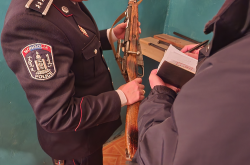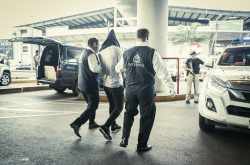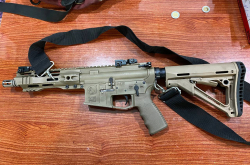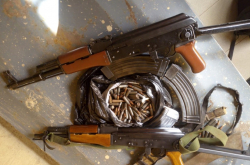Timeframe: 2021 - 2024
Budget: EUR 6 million
Donor: European Union
The situation
Illicit arms trafficking is both a cause and effect of armed conflict in the countries of the League of Arab States (LAS). While smuggling across unguarded land borders remains common, criminals often use maritime lanes to transport arms across the Arabian Sea.
Conflict zones are both a destination and a source for illicit arms. According to the Stockholm International Peace Research Institute, Middle Eastern states imported 2.8 per cent more arms in 2017 to 2021 than they did in 2012 to 2016. This followed an 86 per cent increase in arms imports to the region between 2012 to 2016 compared to 2007 to 2011.
Combating the smuggling and trade of illicit small arms in the Arab region remains crucial to reducing all forms of violence and enhancing global security in line with the United Nations Sustainable Development Goals (SDGs).
Project aims
Now in its second phase, the EU-LAS Project, which is funded by the European Union and implemented jointly by the Small Arms Survey (SAS) as project coordinator, the World Customs Organization (WCO) and INTERPOL aims to strengthen the capacity of the LAS countries to prevent and combat the illicit trade in, and proliferation of, small arms and light weapons.
Specifically, the project aims to:
- Enhance security in post-conflict situations;
- Strengthen LAS Member States’ national control over small arms and light weapons (SALW) at key stages of their life cycle;
- Enhance the exchange of best practices and lessons learned.
The project comprises the following areas:
- International SALW transfer control (combating illicit arms flows);
- Identification and disruption of illicit small arms trafficking and arms-related crime (capacity-building for law-enforcement agencies);
- Other small-arms control measures (stockpile management and security);
- Disarmament, demobilization and reintegration (DDR);
- Provision of information relevant to illicit SALW and enhanced SALW control.
Project activities
INTERPOL will deliver a range of training activities for national law enforcement agencies leading firearms trafficking and related investigations. Such training will also help beneficiary countries build a sustainable strategy against the illicit proliferation of small arms and light weapons.
The national and regional training will include modules on:
- Methods and techniques specific to firearms trafficking investigations;
- INTERPOL tools, including INTERPOL Notices
- Firearms identification and the use of INTERPOL’s Firearms Reference Table
- INTERPOL Firearms Protocol and best practices of firearms investigations
- Developing records keeping of illicit firearms
- Querying and Tracing intelligence on recovered firearms through iARMS
- Responding to international trace requests
- Detection, trends, and emerging threats
- Crime Scene Management and Firearms recovery
Phase II of the project also comprises the following:
- Regional workshops (exchange best practices and lessons learned)
- Regional meetings (Discussing future cooperation on small-arms control);
- Field operations (provide support to national security forces in the fight against arms trafficking)
The project is implemented in close cooperation with the league of Arab States Secretariat, Department of Arms Control and Disarmament.








